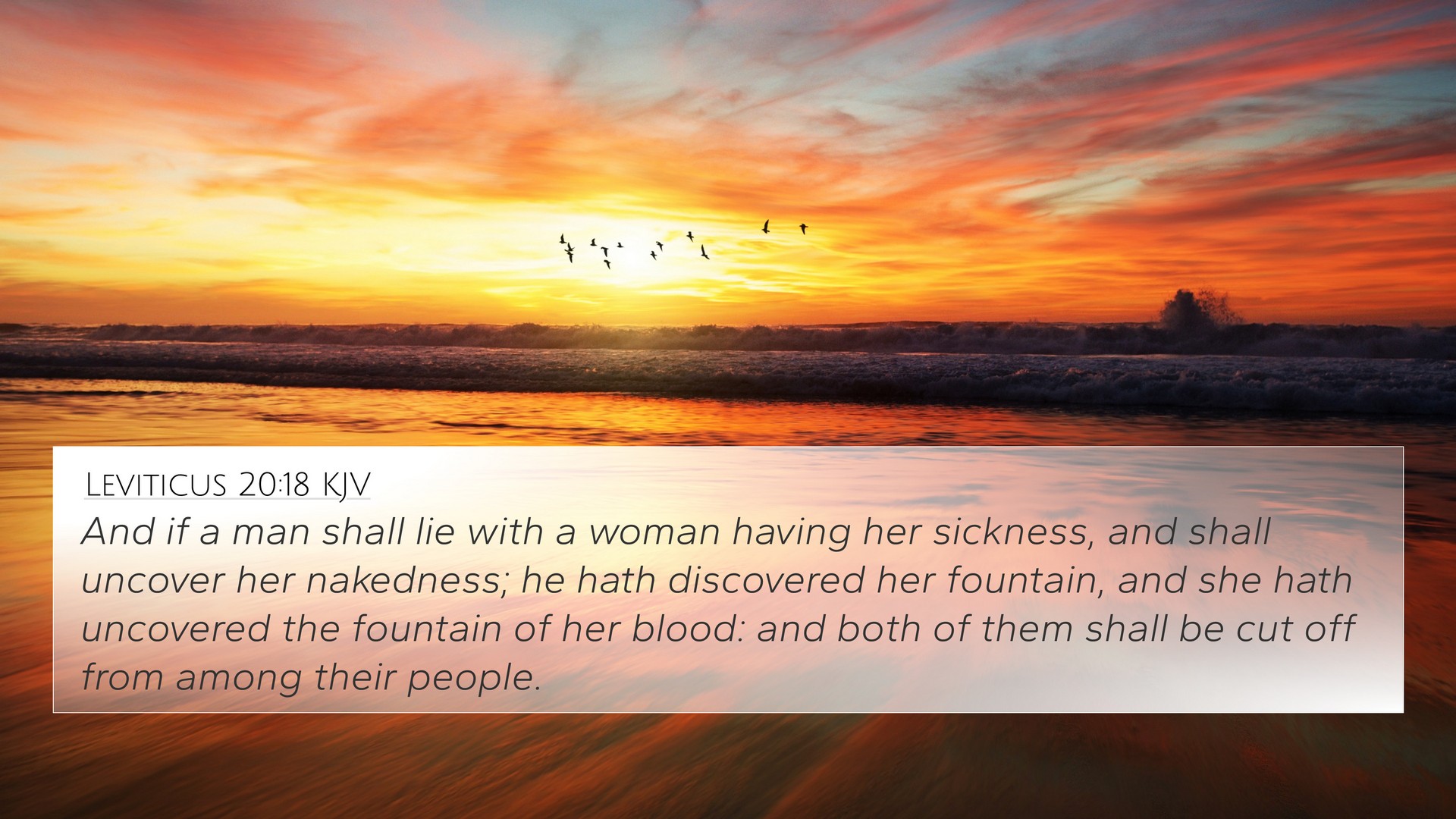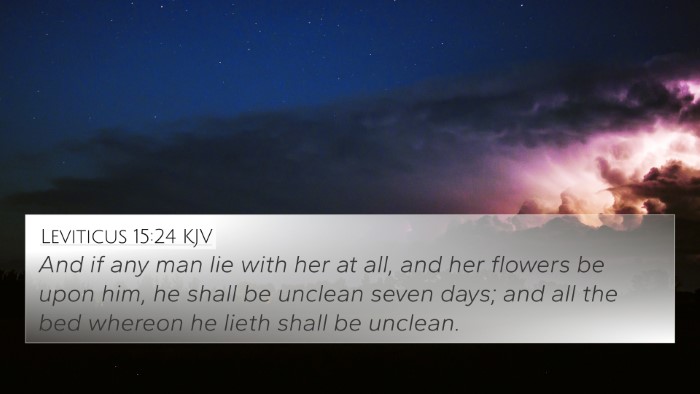Understanding Leviticus 20:18
Leviticus 20:18 states: "And if a man shall lie with a woman having her sickness, and shall uncover her nakedness; he hath discovered her fountain, and she hath uncovered the fountain of her blood: and both of them shall be cut off from among their people." This verse addresses issues of sexual conduct and the laws surrounding ritual purity.
Summary of Insights
This passage illustrates the gravity of sexual relations during a woman's menstrual cycle, emphasizing the importance of adhering to God’s laws pertaining to purity and holiness.
Commentary Insights
- Matthew Henry: He notes that the laws in Leviticus serve to separate Israel from the surrounding nations, warning them of the consequences of violating these commandments. Henry emphasizes the importance of holiness, which is critical for God's people.
- Albert Barnes: In his analysis, Barnes discusses the significance of maintaining ceremonial purity and moral standards. He highlights that failing to observe these laws could lead to community exclusion, which serves as a form of punishment and social discipline.
- Adam Clarke: Clarke offers a detailed examination of the cultural context and the spiritual implications of sexual relations during menstruation. He argues that the prohibition is rooted in a larger divine directive aimed at fostering a holy community.
Cross References
This verse connects with several other passages, which highlight the overarching themes of sexual morality, purity, and the consequences of sin. Here are some relevant cross-references:
- Leviticus 15:19-30: Addresses laws related to bodily discharges, including menstruation.
- Exodus 19:6: Highlights God’s call for Israel to be a holy nation.
- 1 Corinthians 6:18-20: New Testament parallel on fleeing from sexual immorality.
- Hebrews 13:4: Affirmation of the sanctity of marriage and the consequences of immorality.
- Deuteronomy 23:17-18: Discusses the implications of ritual purity and associated behaviors.
- Galatians 5:19-21: Lists the works of the flesh, emphasizing the importance of moral living.
- 1 Peter 1:14-16: Calls believers to conduct themselves in holiness, reflecting on God’s holiness.
Connections Between Bible Verses
The verse from Leviticus establishes a critical connection with both the Old Testament laws concerning ritual purity and the moral imperatives later outlined in the New Testament. This demonstrates a continuity of God’s desire for His people to reflect His holiness in their lives.
Thematic Bible Verse Connections
This verse can be understood in the context of God's command to His people to maintain purity. Some recurring themes include:
- Purity: A central theme not only in Leviticus but also throughout the Bible.
- Holiness: Emphasized in various Scriptures, illustrating the nature of God.
- Consequences of Sin: A prevailing theme that shows the serious nature of disobedience.
Cross-Referencing Biblical Texts
Utilizing effective tools for Bible cross-referencing can enhance one’s understanding of these connections. Methods such as using a Bible concordance or a structured Bible cross-reference guide can assist in discovering how various scriptures relate to one another and build a cohesive understanding of Biblical teachings.
How to Use Bible Cross-References
To correctly identify and utilize cross-references in Scripture, consider these steps:
- Consult a reliable Bible concordance for thematic search.
- Look for marginal notes or footnotes that often indicate related verses.
- Engage in comparative Bible verse analysis to find parallels and contrasts.
Finding Cross-References in the Bible
When seeking to deepen your understanding of Leviticus 20:18 or similar verses, consider asking:
- What verses are related to the themes of purity and holiness?
- How do Old and New Testament teachings connect regarding sexual conduct?
- Are there parallels with other laws in Leviticus or with New Testament teachings?
Conclusion
Leviticus 20:18 serves as a reminder of the importance of holiness and the seriousness with which God views interpersonal relationships and community standards. By engaging with the various commentaries and cross-referenced scriptures, readers can gain profound insights into the divine intent behind these laws and their relevance throughout Biblical history.






